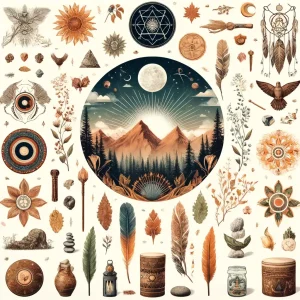Shamanism is one of the oldest spiritual and healing practices in the world, rooted in the traditions of countless cultures over thousands of years. This journey into the origin of shamanism reveals how these ancestral practices have influenced the way human beings understand and relate to the natural world, the cosmos, and the spiritual realm.
Prehistoric Roots
Shamanism likely emerged during the Upper Paleolithic, as indicated by cave paintings and artifacts found in caves throughout Europe and Asia, dating back 40,000 years. This early evidence suggests that shamans occupied a central role in their communities, acting as mediators between human beings and spiritual forces. It is believed that they used rituals and altered states of consciousness, achieved through dances, drums and natural substances, to cure diseases, guide the souls of the deceased and ensure success in hunting and other vital activities.
Global Diversification
As human populations expanded and diversified, shamanism also branched out in different forms throughout Asia, Africa, the Americas, and Europe. In Siberia, shamans were known for their ability to go into a trance and communicate with the spirit world. In North and South America, indigenous shamans used sacred plants such as tobacco and ayahuasca to facilitate spiritual insights and deep healings.
Shamanism in Agricultural and Urban Societies
With the advent of agriculture and the formation of more complex and urbanized societies, the role of the shaman evolved. In ancient civilizations such as the Mayans, Aztecs, and Egyptians, shamans or priests assumed more prominent ceremonial and political roles, mediating not only between the community and the spirits, but also between the ruler and the people.
Shamanism Today
Today, shamanism has experienced a resurgence in popularity, both in traditional societies and in modern contexts. Many people look to shamanism for alternatives to contemporary medical and spiritual solutions, valuing its holistic approach and deep respect for nature. In addition, the value of shamanic knowledge has been recognized in fields such as ecology and psychotherapy, where traditional techniques can offer new perspectives and tools.
Contemporary Relevance and Future Perspectives
Shamanism, with its origins in prehistory, is still relevant in the 21st century, offering wisdom and techniques that promote healing and understanding between humans and the natural environment. Their ability to adapt and survive socioeconomic and cultural changes speaks to their fundamental power and resilience. Through Ancestrina, we invite you to explore and experience the rich spiritual heritage of shamanism, discovering how these ancient practices can enrich your modern life.











